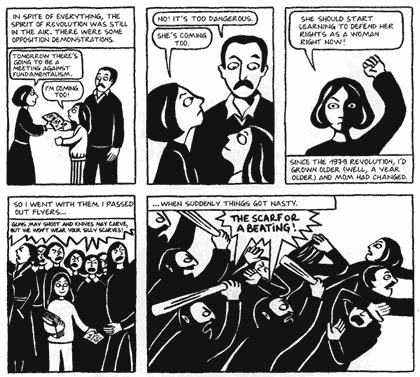
The four stories I read from Salwa Bakr's
The Wiles of Men and Other Stories, titled "Thirty-one Beautiful Green Trees," "Dotty Noona," "An Occasion for Happiness," and "That Beautiful Undiscovered Voice" affected me deeply. These stories address the societal and marital entrapment of women in Egypt as well as the United States.
In "Thirty-one Beautiful Green Trees," Kareema Fahmi, the narrator, expresses her dismay at having forgotten her brassiere while she is on her way to work. She says, "I went on my way again thinking about brassieres and who had invented them and what was the significance or the point of them," and "what was so shameful about a woman's breasts?" (18). Fahmi's sexual oppression is the same oppression faced by women all over the world who are made to feel ashamed of their bodies and sexuality.
Later in this story, after constant criticism for speaking her mind, Kareema decides that cutting off her tongue, which she sees as the root of her trouble, is the only solution. Although her literal opinion is extreme, Kareema's desire to silence herself mirrors the self silencing of the women of the world. She also draws a parallel between her vocal silence and sexual silence, saying, "I remembered my circumcision operation when I was nine and said to myself: Never mind!" (25).
The theme of the cultural and self silencing of women's voices continues throughout these stories. In "Dotty Noona," Noona, a servant, is slapped for making fun of her employer's little boy for not knowing the answer to a math question, which Noona knows the answer to. Along with women's rights, this story also addresses class differences, and the fact that being a poor girl is a double burden. In "An Occasion For Happiness," Fawziyya learns that becoming a woman means speaking "in a subdued voice, as her mother always asked of her," (53).
In "That Beautiful Undiscovered Voice," Sayyida, a house wife, discovers one day that she has a beautiful singing voice. She begins to dream of singing in front of other people so that her gift does not go to waste. When she tells her husband, he believes she has gone mad and urges her not to tell anyone. Sayyida realizes she has no friends to discuss her problem with, so she tells the grocer, who promptly tells her husband. Enraged and determined to "help" his wife and family, her husband brings her to a male doctor, who prescribes her some pills. No one in this story is willing to even listen to Sayyida sing her song. In the end she learns to suppress her "voice," and thereby her creativity. This story made the strongest impact on me, because of it's representation of the misled and even love-driven stifling of women's voices, told through the clever metaphor of the silencing of one woman's beautiful singing voice.
 Marjane Satrapi's graphic novel, Persepolis, is not only a story of a childhood, but the story of a people and a nation. Her consistent wit and humor in the face of traumatic violence drew me in as a reader, opening my mind to more dry political subjects. Her novel is indeed an incredibly affective teaching tool for teens and adults alike.
Marjane Satrapi's graphic novel, Persepolis, is not only a story of a childhood, but the story of a people and a nation. Her consistent wit and humor in the face of traumatic violence drew me in as a reader, opening my mind to more dry political subjects. Her novel is indeed an incredibly affective teaching tool for teens and adults alike.


